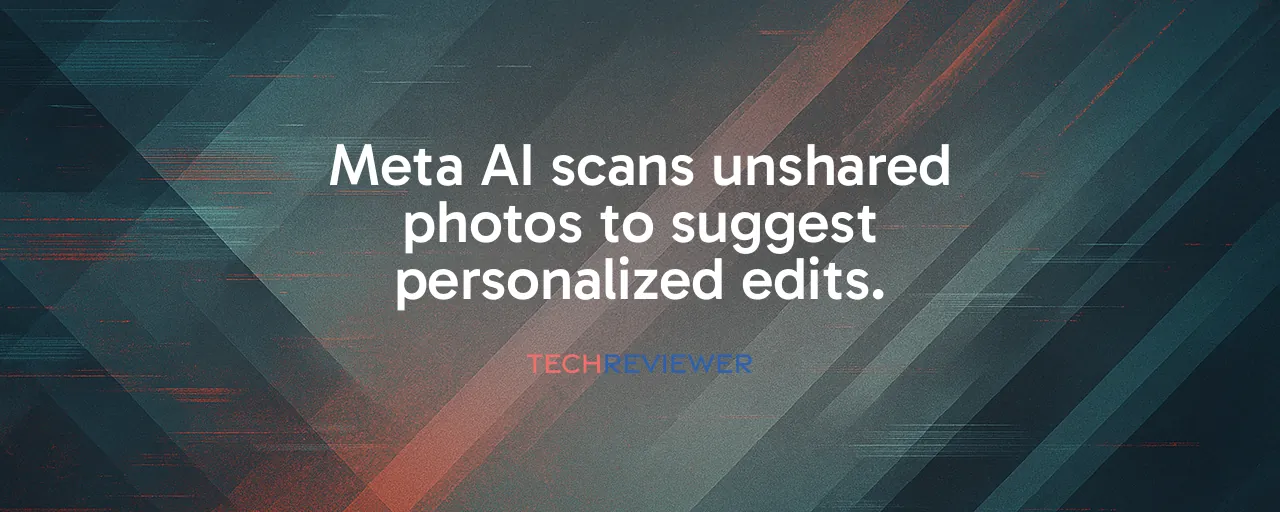A New Kind of Photo Sharing
Meta's latest move lets its AI peek into your phone's camera roll, suggesting edits for photos you haven't even shared. Launched across the U.S. and Canada in October 2025, this feature, which began testing in June, asks users to opt in for cloud processing. Once enabled, the Facebook app uploads your images to Meta's servers, where AI crafts ideas like collages, birthday recaps, or stylized edits to nudge you toward posting on your Feed or Stories. It's a clever way to revive declining user posts, but it comes with a catch: your private photos are now fair game for analysis.
The system uses advanced tech, like Meta's Llama model, to spot objects, people, and dates in your photos. It can suggest a graduation montage or a festive filter based on what it sees. For a company struggling with users sharing less, this is a bold play to keep Facebook relevant. In 2025, AI-powered recommendations increased time spent on Facebook and Instagram by 5-6 percent respectively, and Meta's betting this will further hook its 3.43 billion daily users across its Family of Apps.
Privacy Takes a Hit
Let's talk about the elephant in the room: privacy. When you opt in, Meta's AI doesn't just look at your photos; it analyzes faces, relationships, and events, building a detailed picture of your life. The company insists it won't use your unshared photos for ads or AI training unless you edit or post them. But the fine print in Meta's AI Terms of Service allows it to summarize, modify, and generate new content from your images. That's a lot of power over pictures you never meant to share.
Privacy advocates, like those at Proton, sounded alarms when the feature first popped up. Some users found toggles enabled without clear consent during early tests, sparking outrage in anti-AI Facebook groups. Posts warning about data collection went viral, reaching millions by July 2025. The concern? Meta's history, from Cambridge Analytica to a $5 billion FTC fine, doesn't inspire trust. Plus, photos of friends or kids in your camera roll get swept into this without their say, raising ethical red flags.
Learning From Meta's Missteps
To understand the stakes, look at a case from summer 2025. Anti-AI groups on Facebook became hubs for users swapping tips on disabling the feature after unexpected permission prompts. Many felt blindsided, with some abandoning public posts for private chats. This backlash shows a clear lesson: consent must be crystal clear. Meta's opt-in model sounds good, but murky implementation, like pre-enabled toggles, erodes trust. Transparency, not just terms buried in fine print, is critical for user buy-in.
Compare that to Apple's approach with its Clean Up feature, launched in October 2024. Unlike Meta's cloud-based system, Apple processes photos on-device, keeping data off servers. It's limited to newer hardware like iPhone 15 Pro and later models plus M1 Mac or iPad devices, but users feel safer knowing their images stay local. Meta's reliance on cloud uploads, while enabling more advanced AI, introduces risks like data breaches or interception. Apple's model proves you can deliver AI magic without compromising control, a lesson Meta could learn from.
The Bigger Picture in the AI Race
Meta's camera roll feature isn't just about sprucing up your photos; it's a power move in the AI race. By accessing unshared images, Meta gains a treasure trove of data, your interests, relationships, and habits, that competitors like Google Photos can't touch. This fuels Meta's $64-72 billion AI infrastructure push in 2025, aiming to outpace rivals. Google's Magic Editor, rolled out to iOS users in 2024, and Samsung's AI gallery tools show the industry's sprint to dominate AI photo editing. But Meta's edge lies in its vast user base and deep data well.
Still, there's a flip side. Regulatory heat is rising. The EU's AI Act and California's privacy laws demand transparency and consent, and Meta's already faced scrutiny from the Irish Data Protection Commission. If users balk or regulators crack down, Meta risks losing ground to privacy-focused platforms. The challenge is balancing innovation with trust. Right now, Meta's betting big on AI to keep you scrolling, but it's walking a tightrope over a growing privacy backlash.
